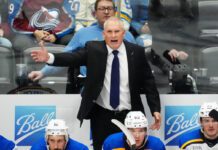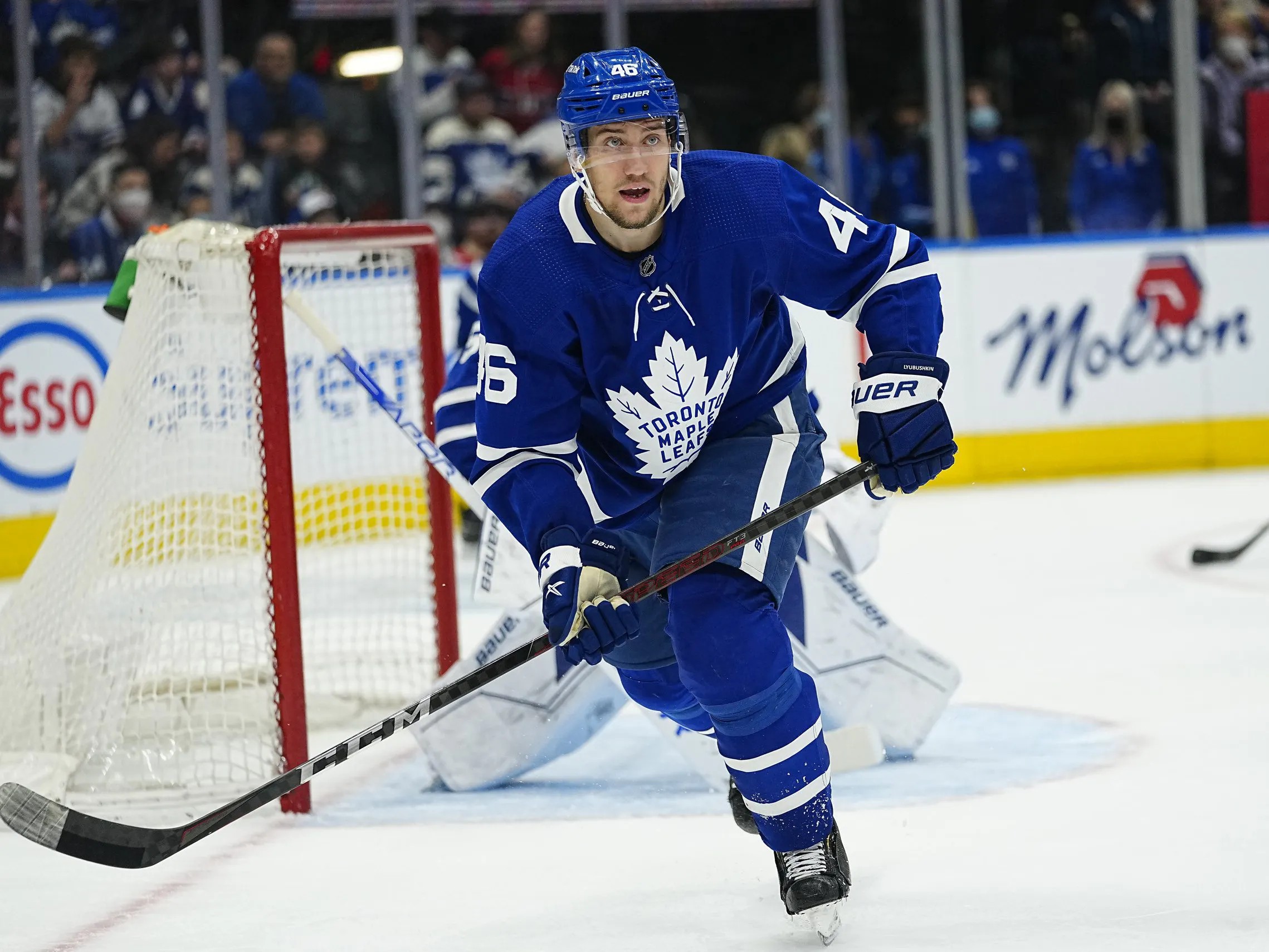The Toronto Maple Leafs have reunited with old friend Ilya Lyubushkin.
The full three-way trade is as follows:
To Leafs: Ilya Lyubushkin (75% retained)
To Ducks: The Leafs‘ third round pick in 2025
To Hurricanes: The Leafs‘ sixth-round pick in 2024
The trade comes on the heels of a Timothy Liljegren injury that forced the Leafs to dress six left-handed defensemen in back-to-back games followed by a Mark Giordano injury earlier tonight that forced them to play Mitch Marner on defense for nearly half of the game.
The 75% retention shaves Lyubushkin’s cap hit all the way down to $687,500, leaving the Leafs with room to make more moves. The third-rounder coming in 2025 rather than this year ensures the team keeps a decent asset in their back pocket for another move while also giving them time to backfill the third-round pick in 2025 if they really want to. It should be noted the Leafs now don’t own a pick in the first four rounds next year.
First Thoughts on the Lyubushkin acquisition price and fit
I don’t want to call this a panic move. The Leafs were engaged in the discussions before the Coyotes game, but it does seem like there’s some level of desperation considering the state of the defense (Liljegren, Giordano, and Timmins are all out, leaving them with no serviceable righties), in addition to the top right-handed defenseman on the market, Chris Tanev, heading to Dallas yesterday.
Since leaving Toronto, Lyubushkin has played on a mediocre Buffalo Sabres team followed by a terrible Anaheim Ducks team this season. He’s averaging 17:09 per game this season, which is the second-highest total of his career — for what it’s worth, he averaged 16:28 per game in his 31 games with the Leafs — and he has produced just four assists in 55 games.
In terms of his actual play, it’s difficult to break down a defenseman of his ilk when he’s on such a bad team. Somewhat similar to signing Simon Benoit in the summer — which we wrote about at the time — he’s a defensive defenseman who was on a terrible team that doesn’t play with anything resembling defensive structure (the Ducks are 29th in goals against per game). That’s always going to be a recipe for disaster for a gritty, defensively-oriented bottom-pairing type of defenseman — which is what Lyubushkin is — and the results reflect as much. It’s not even worth looking at his player charts.
When in Toronto, Lyubushkin produced the best on-ice results of his career, winning slightly in shot share (51.69) and expected goals (51.86) while getting outscored slightly, 20-21, at five-on-five. His most common linemate was Morgan Rielly, and their numbers as a pairing were slightly better than that at five-on-five while finishing 14-14 in goals for/against. The playoffs were a tougher story, but the results were at least serviceable in the regular season.
While Lyubushkin isn’t a difference-making defenseman that the Leafs need at the top of the lineup, the thinking here is more along these lines: Is Ilya Lyubushkin on his strong side better than William Lagesson on his off-side? For whatever it’s worth, Rielly-Lagesson has actually produced pretty good numbers together so far in a small sample, but the awkwardness of the fit between the two is also pretty clear.
As a depth defenseman who can provide some physicality, Lyubushkin is a fine enough player, but it’s fair to question the price. If they could have simply traded their first-round pick before for Chris Tanev, is it really more sensible to trade a third for a player who is multiple notches below Tanev? In fairness, the gap in draft-pick value is notable — that is somewhat reflected in the calibre of player that’s been acquired — but this is also a Leafs team that has a clear need up the roster, a roster that is good enough at other positions to push in some chips. They bought on the not-so-cheap for right-handed depth rather than simply paying up for a high-quality player.
That’s essentially the crux of the matter in terms of weighing up the decision-making by Treliving. It’s high-stakes poker, essentially. Do you pay more for a better player, or pay less — but still a decent amount — for a much lesser player while leaving yourself some extra cap space to potentially make another addition? You would have to assume that Treliving paid for double retention so that he can, in fact, do something more.
Regardless of what additional moves the Leafs make from here, we know the Leafs simply need NHL defensemen right this second. We don’t yet know when Liljegren will return — or Timmins, for that matter — and Giordano just sustained a head injury at 40 years old. That leaves them staring down the prospect of a defense unit with Lagesson and Max Lajoie dressing on the third pairing.
We will see some talk that the above scenario would’ve been better than paying the two picks for a heavily retained Ilya Lyubushkin, who might not be an NHL defenseman, but I would disagree on this count. He’s played on terrible teams basically his entire career, and the one time he wasn’t on a terrible roster, he was a serviceable third-pairing defenseman. He can also contribute on the penalty kill and bring physicality, giving the Leafs three defensemen the opposition will need to keep their heads up against. That isn’t nothing when the Leafs could end up drawing Florida in the first round.
It would also mean the Leafs can, in theory, keep the Brodie-Liljegren and Benoit-McCabe pairs together, which is what they rode with during most of their seven-game winning streak. As we saw with Brodie moving to the left for the first time this season and instantly improving, there’s value gained from simply being slotted in the right position. Lyubushkin, by virtue of being right-handed, helps them put their unit into alignment. During their winning streak, we saw Lagesson, Lajoie, and Marshall Rifai taking third-pairing shifts. Now we’re talking about Rielly – Lyubushkin, which is clearly a big upgrade on those pairings.
This should be a seamless transition since the player and team are already familiar with each other. That’s at least somewhat noteworthy; we saw a player such as Jake McCabe, who is a good defenseman, struggle to adjust quickly last season. We will see if going from a really bad team to a good one makes for a difficult adjustment for Lyubushkin.
All in all, it’s a player who has been solid in Toronto in the past, checks some boxes for the Leafs’ needs (right-handed shot, some penalty-killing ability, and an added level of physicality), and it doesn’t preclude them from making other moves. If Lyubushkin takes a solid shift, it’ll be a good deal. If he doesn’t, it won’t age well.






























![New Leaf Anthony Stolarz on the opportunity in Toronto: “In Florida, I knew my role as a backup… Now, [Joseph Woll] and I are competing for starts… As a goalie, that’s all you can ask for” Anthony Stolarz, Stanley Cup win, now Maple Leaf](https://mapleleafshotstove.com/wp-content/uploads/2024/07/anthony-stolarz-sc-100x70.jpg)
